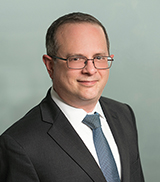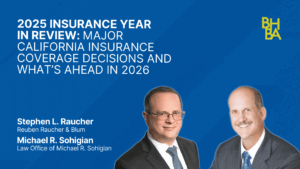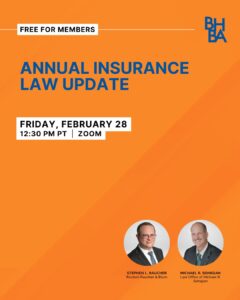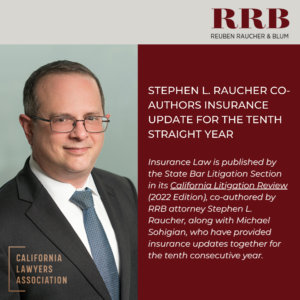
In Another Planet Entertainment, LLC v. Vigilant Ins. Co., 15 Cal. 5th 1106 (2024), the California Supreme Court clarified that the actual or potential presence of COVID-19 on an insured’s premises generally does not constitute direct physical loss or damage to property within the meaning of a commercial property insurance policy.
Plaintiff Another Planet, a promoter and venue operator for live entertainment, filed suit against defendant Vigilant Insurance following Vigilant’s denial of coverage for business losses resulting from the COVID-19 pandemic. The district court granted Vigilant’s motion to dismiss, finding Another Planet failed to allege facts showing direct physical loss or damage to property needed to trigger coverage. On appeal, the Ninth Circuit certified to the California Supreme Court the question of whether the actual or potential presence of the COVID-19 virus causes direct physical loss or damage to property.
The Supreme Court invoked the “long-standing California view” that direct physical loss to property requires distinct, demonstrable, physical alteration of property. The Court maintained this physical alteration must result in some injury or impairment of the property itself. As the Court explained, “The physical alteration need not be visible to the naked eye, nor must it be structural, but it must result in some injury to or impairment of the property as property.”
Another Planet argued the COVID-19 virus causes direct physical damage to property by physically altering surfaces on a microscopic level. The Court found Another Planet failed to explain how the property was actually damaged by the presence of the COVID-19 virus. “The mere fact of microscopic bonds between the virus and a surface says little about the effect of such microscopic bonds on that surface.” The Court noted that the “relevant physical characteristics” of the property were unaffected by the presence of the COVID-19 virus.
The Court also found unpersuasive Another Planet’s complaint that the actual or potential presence of COVID-19 virus rendered its property unusable for its intended purpose. To the extent the physical presence of the virus caused the property to become unusable, the Court found Another Planet failed to establish a distinct, demonstrable, physical alteration to the property: “Where a substance is alleged to cause harm to humans, rather than property, it must still alter the property itself in a lasting and persistent manner.”
The Court refrained from deciding whether the COVID-19 virus could ever constitute direct physical loss or damage to property. However, the Court characterized Another Planet’s allegations as “typical of the allegations offered by many insureds in similar situations.”
The California Supreme Court shut off a second avenue to coverage in John’s Grill, Inc., et al., v. The Hartford Financial Services Group, Inc., et al., 2024 Cal. LEXIS 4241. In John’s Grill, the Court upheld the restrictive language of an insurance policy’s limited fungi, bacteria or virus coverage endorsement, reversing the Court of Appeal’s finding that ambiguous language rendered the coverage illusory.
Under specific additional coverage provided by the endorsement, the insurer agreed to pay for loss or damage caused by virus. The policy defined loss or damage as direct physical loss or damage to property, as well as the cost of structural mitigation work to remove a virus and testing for it once the work was done. A separate clause provided the endorsement applied only when the virus resulted from one or more specified causes of loss, including fire, explosion, windstorm, vandalism, and water damage.
Though John’s Grill acknowledged it could not meet the specified cause of loss limitation, it contended the limitation was illusory and unenforceable because the specified causes “are not the kind of things that cause a virus,” rendering the limitation impossible to satisfy. The Court of Appeal agreed, finding the clause did not offer a realistic prospect for virus-related coverage. The California Supreme Court reversed, holding the Court of Appeal erred by declining to enforce the limitation.
Noting that it has never actually recognized an “illusory coverage doctrine as such,” the Supreme Court emphasized that the test for coverage must focus on the “objectively reasonable expectations of coverage.” The Court found that clear and unambiguous policy language defined the factual scenarios in which John’s Grill would have coverage. “A reasonable insured would understand that virus coverage under the Limited Fungi, Bacteria or Virus Coverage endorsement was limited and would be available only if the virus resulted from certain causes.” Based on the policy language, John’s Grill could not show an objectively reasonable expectation for virus-related coverage beyond the policy’s terms.
The Court went on to hold that even John’s Grill’s own articulation of the illusory coverage doctrine was insufficient to justify disregarding the plain language of the policy. The Court found that John’s Grill had not sufficiently alleged that the forces and phenomena identified in the specified cause of loss limitation were incapable of creating conditions fairly said to be a proximate cause of a virus. The fact that John’s Grill’s particular business arrangements made it unlikely to benefit from the limited virus coverage was insufficient to render the promised coverage illusory.
Thus, even where the policy purported to provide some coverage for virus-related losses, the Court found there was none. So ends the search for COVID-19 business interruption coverage in California.




